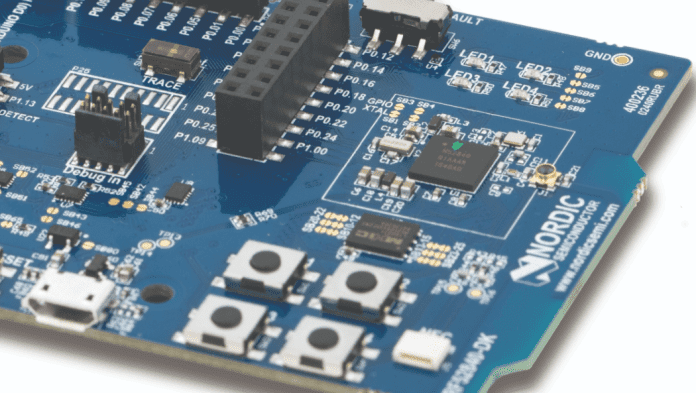IoT chipmaker Nordic Semiconductor has added artificial intelligence (AI) and machine learning to its flagship series of Bluetooth IoT chips, to bring contextual insights at the very edge on low-power IoT devices. The move follows a partnership with US-based Edge Impulse, which makes miniaturised machine learning (or ‘TinyML’) tools for chips in resource constrained IoT modules.
Nordic Semiconductor said it is the first time AI has featured on Bluetooth-based IoT system-on-chips (SoCs). The company’s nRF52 and nRF53 series of Bluetooth Low Energy (BLE) chips will now come with embedded AI as standard. “This is a first for the Bluetooth semiconductor industry,” it said.
Kjetil Holstad, director of product management at Nordic Semiconductor, commented: “[Running] AI… on resource-constrained chips… take[s] the application potential of wireless IoT technologies such as Bluetooth to a whole new level in terms of environmental awareness and autonomous decision making.
“Although we have had customers build and run TinyML applications on Nordic’s Bluetooth chips in the past, [it previously] required quite a high level of mathematical and computer programming expertise, using professional science industry and academia software like MATLAB.”
Nordic Semiconductor is using Edge Impulse’s Edge Optimized Neural (EON) compiler in its BLE chips. The Edge Impulse kit “optimize[s] computer processing and memory use by up to 50 percent when running TinyML on resource-constrained devices,” according to the firm.
The application of device-based AI for low-power IoT applications will be used, for example, to establish and detect normal and abnormal patterns in audio and vibration data, suggested the firm. It cited variously usage in IoT applications for anti-poaching, machine maintenance, and power line failures, where analytics are run on audio and vibration data to detect gunshots, mechanical operations, and other abnormalities.
But BLE-based IoT applications “from asset tracking to wearables” stand to benefit, it added. The winning entry in a recent Hackster.io and Smart Parks developer challenge, to develop a wildlife tracker, employed the nRF52840 SoC with an accelerometer, camera, and microphone, and ran TinyML-based camera vision models to monitor the movement of elephants and their risk of poaching.
Holstad said: “Our partnership with Edge Impulse will… remove all the complexity and previous technological barriers-to-entry for our customers wishing to add TinyML features to their Bluetooth applications. Customers [can] be up and running TinyML on their applications within an afternoon – and at an ultra-low power consumption level that still supports extended battery operation, even from small batteries.”
Zach Shelby, co-founder and chief executive at Edge Impulse, said: “Nordic Semiconductor is… bringing AI and machine learning to the wireless IoT masses… Leveraging the fact every Nordic nRF52 and 53 Series Bluetooth SoC employs at least one Arm core processor, and is designed for ultra-low power battery operation, this partnership is effectively democratizing access to state-of-the-art TinyML within the Bluetooth market.”

